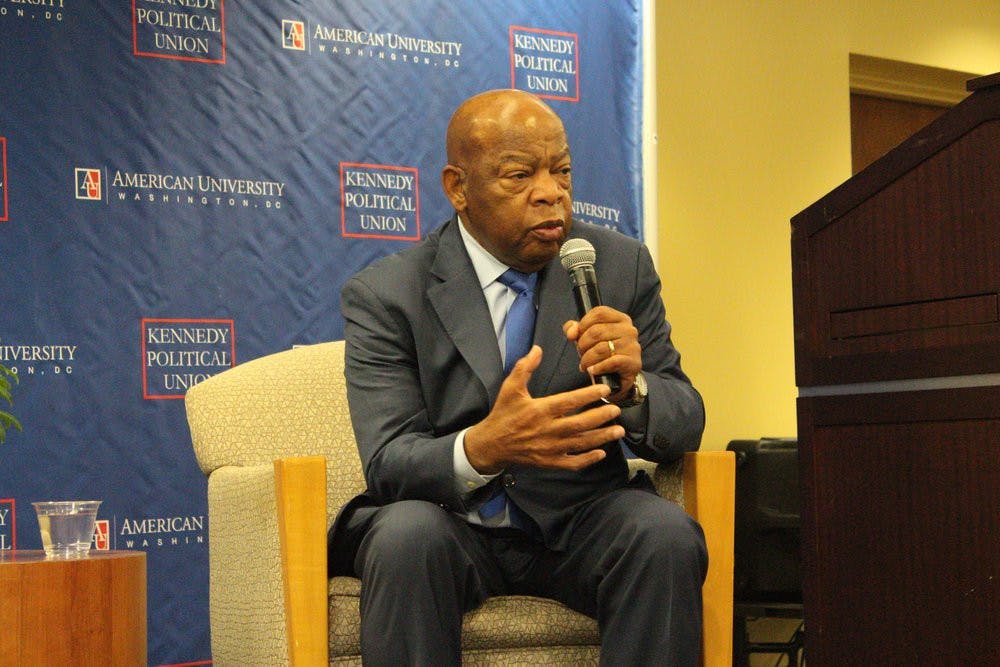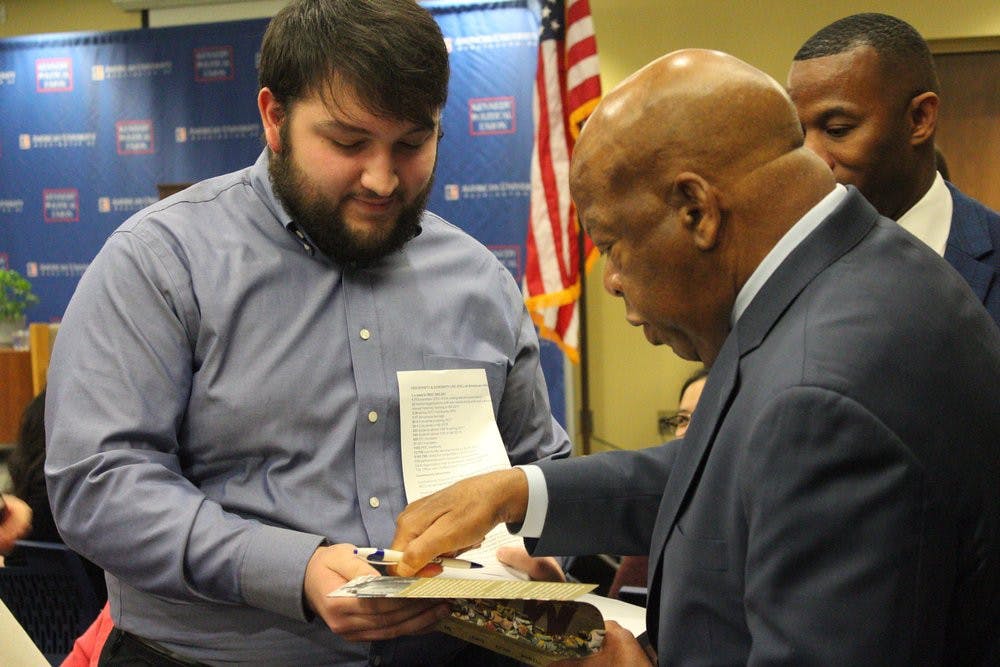BY: ALEXIS ARNOLD & JENNA CALDWELL

Photo by Mariah Espada
"You don't know anything about raising chickens?" Congressman and Civil Rights leader John Lewis stood tall on a podium. Before him, an audience of students stares back, unblinking.
"No? You're supposed to be so smart and gifted," he said.
The crowd erupts with laughter—a mix of amusement and awkwardness—the admittance of not possessing any labor skills, consumes the crowd.
Rep. Lewis gave a lecture on Saturday, speaking at length about the era of segregation in which he grew up and how meeting Dr. Martin Luther King Jr. shaped the the man he is today.
Rep. Lewis met with several brothers from the multicultural fraternities and posed for photos with the young men. Lewis headed downstairs and was met by a packed room of people waiting to hear him speak. Lewis even took the time to sign a copy of his book an audience member held out to him as he was being ushered out of the room.
But before Lewis took the stage, The Blackprint got a chance to sit down with the civil rights champion and U.S representative to discuss the power of nonviolence and what young people can still learn from the Civil Rights Movement.
On how meeting Dr. Martin Luther King Jr. changed his life
"Well, I think it's important for young people, especially for students—who are so smart, becoming well educated—to know about the history of the struggle for justice, for freedom, what is right and fair. I grew up in rural Alabama, 50 miles from Montgomery, outside of a little town called Troy. I saw the signs that say ‘white men,' ‘colored men,' ‘white women,' ‘colored women,' ‘white waiting,' ‘colored waiting.'
I heard of Rosa Parks and Martin Luther King, Jr. when I was 15-years-old in the 10th grade. In 1957, at the age of 17, I met Rosa Parks. The next year, I met Martin Luther King Jr. and it changed my life. It set me on a path to do what I could to bring down those signs that said ‘white waiting,' ‘colored waiting,' ‘white men,' ‘colored men,' ‘white women,' ‘colored women.' I never became bitter or hostile, never had any hate, but I despised the system because it was so wrong. Dr. King inspired me, Rosa Parks inspired me. I think it's important for young people—all young people—doesn't matter whether if they're Black or white, Latino, Asian-American or Native-American to understand what the struggle is all about. Our country is a much better country, and we're much better people because of the Civil Rights Movement."

Photo by Mariah Espada
On Colin Kaepernick and the controversy surrounding his Citizen of the Year' award
"I think this young man helped shape and inspire so many people. During the ‘60s we used nonviolent protest. Before we attempted to march from Selma to Montgomery, we kneeled. There's a great picture in my office of me kneeling at a so-called recreation center in Cairo, Illinois in 1962 with a group of high school students. This was a rec center supported by the city [that] Black people couldn't use it. Young Black men and women could not use it. Supported by the taxpayers. And we had a kneel-in in there. So, [Kaepernick] was just picking up, carrying the ball further down the road. And he's probably not receiving the credit that he should be receiving, but he's helping to inspire people all around America and all around the world."
On using nonviolent actions to make change
"Well today, students are much smarter than when we were [students]. We hadn't heard of the internet. Social media? What is that? You have information...you can spread it around the world in a matter of seconds. When students see something not right, not just, not fair, you can organize. Protests take different forms, we used music—people would just make up songs while they were sitting in, while they were marching.
Just a year ago, members of Congress had a sit-in on the House floor. People came to my office, and said ‘Congressman John, what should we do? We need to do something about gun violence.' I said, we make our speeches and then when the word is given, we have a sit-in on the floor. Since I've been in Congress, I've been arrested five times, during the ‘60s I was arrested 40 times. I'm probably going to get arrested again for something. So, it's very simple. You have a moral obligation to do something, to say something when you see something that is not right, not fair, not just. Just do it in an orderly, peaceful, nonviolent fashion.
On the success of the Congressional sit-in for gun control he led
"I think and truly believe, and I think the great majority of my colleagues believe it was quite successful, that we were able to occupy the floor of the House. For 26 hours [we sat] and people noticed it all over America and around the world. And I think one day, in the distant future, we're going to see meaningful pieces of legislation introduced in the Senate and the House, and we're going to pass them. We're losing too many people because of gun violence, but not try to take people's guns away—those same people shouldn't have guns. We don't have wild creatures running through our towns and our cities, why do we need these powerful guns?
After going around killing people—whether it's in Las Vegas or in Orlando, the church in Texas or Charleston, South Carolina or people in the home —there are people who have problems, mental problems, and shouldn't have a gun. People who go around beating their husbands or their wives shouldn't have a gun. We can control that."

Photo by Mariah Espada
A final word of advice
"I say to students and young people all over America—some that come to my office, I visit colleges and universities, I visit elementary schools, high schools —and I tell young people read your literature...and you too could do something. You too could make a contribution, but do it in an orderly, peaceful, nonviolent fashion. It's protected by the constitution, it's protected by the First Amendment, and we should use it. Use it to bring about change. Use it to educate, to inspire and to move a nation. And in moving a nation, maybe you can help move the world."


